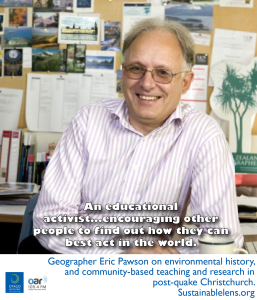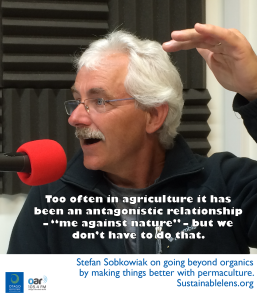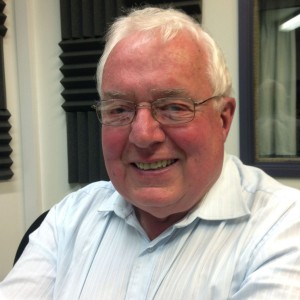An educational activist…encouraging other people to find out how they can best act in the world.
Eric Pawson is Professor of Geography at the University of Canterbury. He has written several books on New Zealand’s environmental history and his recent work concerns biological economics. He is President of the Ako Aotearoa Academy of Tertiary Teaching Excellence – we discuss his approach to “classrooms without borders” and his experiences in community-based teaching and research in post-quake Christchurch.
Talking points
We saw the industrial revolution as a economic process, rather than a series of independent technological innovations.
Working with local schools…adopting the lake shore as a series of outdoor classrooms.
(Success?) Student projects in the residential red zone
How community aspirations might be accommodated around the landscape transformations
Flashpoints can unstick reputations…water quality may be such a flashpoint for us.
(Motivation?) Working with other people on things that are rewarding – that have intrinsic value and a wider purpose. Rather more that information transmission – I don’t believe in an information transmission model of education – I think that education is something that people create for themselves with a certain amount of assistance and guidance. A process of guided self-discovery.
(Activist?) It depends what you mean by activist. An environmental activist in the conventional sense of the word – no. Yes, an educational activist in the senses that I’ve been describing – perhaps less putting myself forward, and more encouraging other people to find out how they can best act in the world. If that’s an activist, then yes.
(Challenge?) I’m retiring – so many exciting things to do, so many exciting places to go. …I will carry on with the community based teaching.
(Miracle?) Not sure I believe in miracles. (the smallest thing that would make the biggest possible difference?) There are an awful lot of people in my home city (Christchurch) who are still in very difficult situations with insurance companies and unmended homes… it is a travesty that after five years we haven’t been able to take care of everybody. I would like us to wave a collective wand and fix this.
This conversation was recorded at the conference of the NZ Geographical Society.




